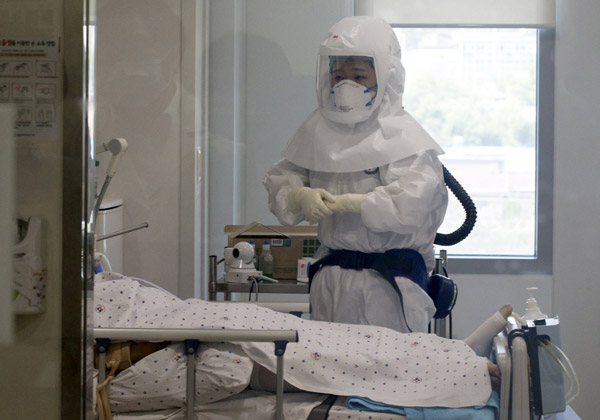 |
|
A health care worker in full protective gear checks on a patient who is infected with Middle East Respiratory Syndrome (MERS) inside an isolation ward at Seoul Medical Center in Seoul, South Korea, June 10, 2015. [Photo/Agencies] |
SEOUL - A deadly outbreak of Middle East Respiratory Syndrome (MERS) forced South Korea's central bank to cut interest rates on Thursday as authorities reported 14 new cases.
Worry in South Korea about the outbreak has been reflected across the region with dozens of suspected cases being tested in Hong Kong, though none confirmed, and many thousands of trips to South Korea cancelled.
South Korea's outbreak, with 122 cases and nine deaths, is the largest outside Saudi Arabia and began last month when a 68-year-old South Korean businessman brought the disease back from a trip to the Middle East.
All subsequent infections have been traced to the original patient and happened in health facilities.
President Park Geun-hye has put off a trip to the United States to deal with the disease as the total number of cases rises daily.
The central bank of Asia's fourth biggest economy said it had to act and cut its policy rate by 25 basis points to a record-low 1.50 percent.
"We decided to cut rates today in a pre-emptive move to contain the economic fallout from MERS," Bank of Korea Governor Lee Ju-yeol told a media briefing.
Economic policymakers were already under pressure to stimulate the economy as weak global demand and a strong won have dented exports and discouraged spending by consumers and companies.
One positive sign was a fall in the number of South Korea's schools and universities that have closed.
The total dipped to 2,431 on Thursday from about 2,700 the previous day after a joint team of experts from the World Health Organization (WHO) and South Korea recommended that schools be reopened as they were unlikely to spread the disease.
"We all need to put behind us excessive fear and psychological withdrawal over MERS and try to go back to normal daily lives next week so we can minimise the impact on the economy," Kim Moo-sung, who heads the ruling Saenuri party, said at a party meeting.